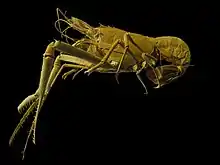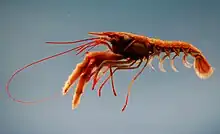Acanthacaris
Acanthacaris is a genus of deep-water lobsters. It contains two species, A. caeca and A. tenuimana, and is the only genus in the subfamily Neophoberinae.[1][2][3]
| Acanthacaris | |
|---|---|
 | |
| Acanthacaris tenuimana | |
| Scientific classification | |
| Domain: | Eukaryota |
| Kingdom: | Animalia |
| Phylum: | Arthropoda |
| Class: | Malacostraca |
| Order: | Decapoda |
| Suborder: | Pleocyemata |
| Superfamily: | Nephropoidea |
| Family: | Nephropidae |
| Subfamily: | Neophoberinae Glaessner, 1969 |
| Genus: | Acanthacaris Bate, 1888 |
| Type species | |
| Acanthacaris tenuimana Spence Bate, 1888 | |
| Species | |
| |
| Synonyms [1] | |
| |
Description
They are relatively large lobsters with a cylindrical body covered with sharp spines (hence the genus name, meaning "spiny shrimp"). The carapace has a well-developed rostrum. The eyes are very small and lack pigment, while the antennae are long and whiplike. The telson and uropods are powerful. The first three pairs of walking legs end in claws. The first pair of claws is symmetrical, and ends in long fingers covered with sharp spines on cutting edges, but without hairs. The second pair of walking legs is much longer than the third pair. Both species reach a length of 40 centimetres (16 in).[1] Acanthacaris have a laterally compressed rostrum, a unique arrangement of postcervical and cellar grooves, a large and elongate scaphocerite, and delicate, elongate claws with cylindrical palms. The acanthacaris have no gatrolateral or postcervical spine.
Taxonomy
The genus Acanthacaris is the only genus in the subfamily Neophoberinae, and contains two species:
- Acanthacaris caeca is found in the Caribbean Sea and the Gulf of Mexico, in burrows at a depth of 290–870 m (950–2,850 ft)
- Acanthacaris tenuimana, the type species, is found in the Indian and Pacific Oceans, on muddy bottoms at a depth of 600–1,670 m (1,970–5,480 ft)
The genus was originally described as "Phoberus" by Alphonse Milne-Edwards in 1881, with "Phoberus caecus" (A. caeca) as the type species; this transpired to be a junior homonym of Phoberus erected by William Sharp Macleay in 1819 (a subgenus of the beetle genus Trox).[1][4] Although the replacement name (nomen novum) "Neophoberus" was provided by Martin Glaessner in 1969,[5] this is pre-dated by Charles Spence Bate's 1888 name Acanthacaris, which has A. tenuimana as the type species.[1]
References
- Holthuis, Lipke B. (1991). "Subfamily Neophoberinae Glaessner, 1969". FAO Species Catalogue, Volume 13. Marine Lobsters of the World (PDF). FAO Fisheries Synopsis No. 125. Food and Agriculture Organization. pp. 26–28. ISBN 92-5-103027-8. Archived (PDF) from the original on 26 October 2021. Retrieved 27 August 2023.
- Holthuis, Lipke B. (December 1974). "Biological Results of the University of Miami Deep-Sea Expeditions. 106. The Lobsters of the Superfamily Nephropidea of the Atlantic Ocean (Crustacea: Decapoda)". Bulletin of Marine Science. 24 (4): 723–884.
- De Grave, Sammy; Pentcheff, N. Dean; Ahyong, Shane T.; et al. (15 September 2009). "A classification of living and fossil genera of decapod crustaceans" (PDF). Raffles Bulletin of Zoology. Suppl. 21: 1–109. Archived from the original (PDF) on 2011-06-06.
{{cite journal}}: CS1 maint: date and year (link) - Strümpher, Werner P.; Scholtz, Clarke H. (2009). "New species and status changes of small flightless relictual Trox Fabricius from southern Africa (Coleoptera: Trogidae)". Insect Systematics & Evolution. 40 (1): 71–84. doi:10.1163/187631209X416723. S2CID 85051308.
- Glaessner, Martin (1969). "Decapoda". In R. C., Moore (ed.). Treatise on Invertebrate Paleontology. Vol. R(2). pp. 399–533.
